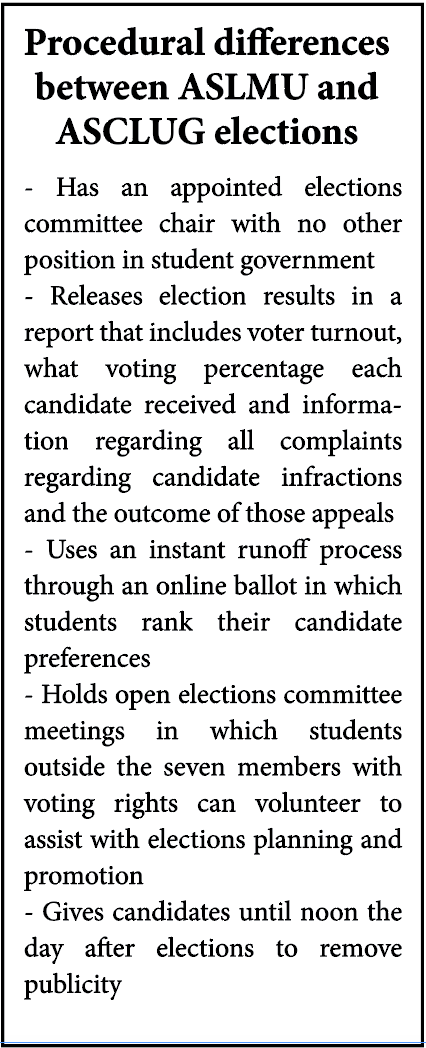The disqualification of two candidates, Junior Representatives Heather Wilson-Hooker and Austin Truong, in this year’s Associated Students of California Lutheran University Executive Cabinet Elections, was announced through a press release on Facebook Friday, Feb. 23, without disclosing to the student body the reason for disqualification. The release stated it was “due to an infraction” in the elections packet signed by each candidate.
Wilson-Hooker and Truong appealed their disqualification in a hearing which was closed to the public, as are all elections committee meetings. Wilson-Hooker ran again and won against three other candidates, while Truong stepped out of the Senate election, which had already gone to a runoff between two candidates.
Wilson-Hooker, who had initially won in an uncontested election for Programs Board director, said she received an email Thursday, Feb. 22 after voting closed that she and Truong were disqualified based on a poster which was left up at Peters Hall. The two candidates had joint marketing.
Truong said he asked for further information regarding the infraction in emails to Daniel Buonauro, Senate director and chair of the elections committee. Buonauro said details could not be disclosed due to confidentiality.
“That’s all I’m asking – where did you find it [the poster], where was it up, and they’re like, ‘We can’t tell you,’” Truong said.
Buonauro said in an interview with The Echo that the disqualified candidates “were made well aware of what the infraction was.” When asked about the details of the infraction, Buonauro said, “I can’t really go into it.” When asked why the information could not be disclosed, he said, “Because what’s stated on the press release is what we’re going to discuss publicly.”
When asked if there are policies on what is regarded as confidential, Buonauro said, “All of the elections packet, constitution and bylaws are all public knowledge.”
Although the elections packet says failure to comply with posting guidelines can result in sanctions other than disqualification, Buonauro said “it’s left to the discretion of the elections committee.”
“When it comes to the elections packet, the bylaws and the constitution, what I have a problem with was that the elections committee can decide whatever they want to do,” Truong said.
The ASCLU Constitution Section Four on elections has two subsections. The first states the elections timeline. The second on elections procedures only states, “All elections shall follow the election procedures outlined in the Bylaws and shall be enforced by the elections committee.”
The ASCLU Bylaws includes one section on elections, which has two subsections headed “Elections Committee” and “Voting and Electing.” The elections committee section outlines membership and duties of the committee. The other section describes how a majority vote is required for executive cabinet positions, and how runoffs will be held when this is not achieved.
The only other supplementary information on elections policies is included in the elections packet given to candidates, which explains campaign rules and states that “any infraction, or subsequent sanctions, will be at the discretion of, and will be enforced by, the Elections Committee.”
The Associated Students of Loyola Marymount University has a 37-page elections code. Briana Maturi is an independent adviser of the ASLMU elections committee, and has no role in the student government outside of advising on the elections code. She said during elections, she keeps the document close by at all times.
“We try to keep things by the code so it is a fair process, and I think transparency is important,” Mercer said.
The Echo was denied a request to see how many votes each candidate received in the ASCLUG elections. Currently, winners are announced on social media with no accompanying data.
Because of this policy, Truong said he cannot be sure whether he would have won the Senate race or made it to the runoff election had he not been disqualified.
Associate Director of Student Life Andrea Treptow, who advises ASCLUG, said the voting percentages are not released in order to avoid upsetting students who may have had a low number of votes and to encourage students to run. Buonauro and ASCLU President Nick Steinwender said a change to this policy is under consideration.
Maturi said she thinks this data is important public information.
“I don’t see a reason not to share that information. We get that information with national elections,” Maturi said.
Maturi said that last year, LMU had a 60.4 percent voter turnout, which she said has increased from the 34 percent turnout from before she started five years ago.
Buonauro said in a follow-up email that the initial Executive Cabinet election Feb. 21-22 had 480 votes. The second cycle for the Senate runoff and Programs Board had 314 votes, and the final Programs Board runoff March 8 had 235 votes. This was a voter turnout of approximately 16 percent of undergraduate students to start, and approximately eight percent by the final election cycle.
Dakota Allen
News Editor
